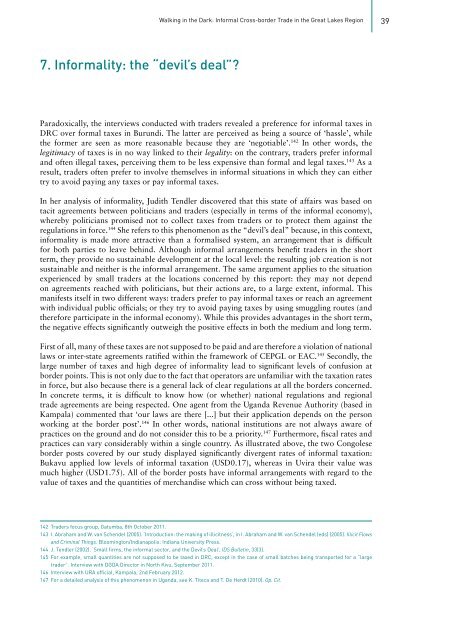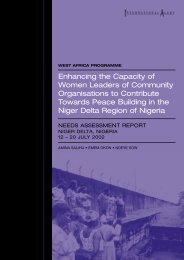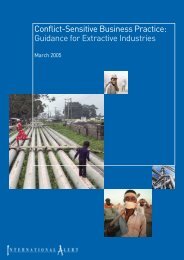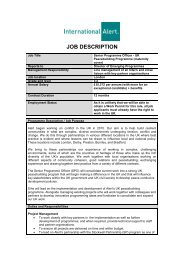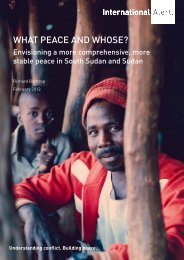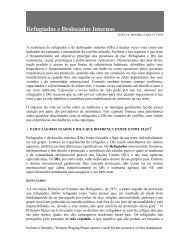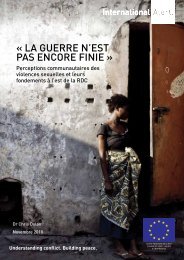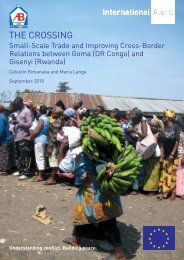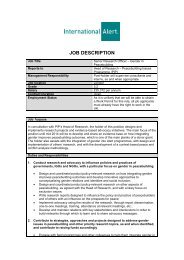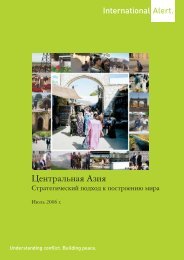Walking in the Dark: informal Cross-border trade ... - International Alert
Walking in the Dark: informal Cross-border trade ... - International Alert
Walking in the Dark: informal Cross-border trade ... - International Alert
Create successful ePaper yourself
Turn your PDF publications into a flip-book with our unique Google optimized e-Paper software.
<strong>Walk<strong>in</strong>g</strong> <strong>in</strong> <strong>the</strong> <strong>Dark</strong>: Informal <strong>Cross</strong>-<strong>border</strong> Trade <strong>in</strong> <strong>the</strong> Great Lakes Region<br />
39<br />
7. Informality: <strong>the</strong> “devil’s deal”<br />
Paradoxically, <strong>the</strong> <strong>in</strong>terviews conducted with <strong>trade</strong>rs revealed a preference for <strong>in</strong>formal taxes <strong>in</strong><br />
DRC over formal taxes <strong>in</strong> Burundi. The latter are perceived as be<strong>in</strong>g a source of ‘hassle’, while<br />
<strong>the</strong> former are seen as more reasonable because <strong>the</strong>y are ‘negotiable’. 142 In o<strong>the</strong>r words, <strong>the</strong><br />
legitimacy of taxes is <strong>in</strong> no way l<strong>in</strong>ked to <strong>the</strong>ir legality: on <strong>the</strong> contrary, <strong>trade</strong>rs prefer <strong>in</strong>formal<br />
and often illegal taxes, perceiv<strong>in</strong>g <strong>the</strong>m to be less expensive than formal and legal taxes. 143 As a<br />
result, <strong>trade</strong>rs often prefer to <strong>in</strong>volve <strong>the</strong>mselves <strong>in</strong> <strong>in</strong>formal situations <strong>in</strong> which <strong>the</strong>y can ei<strong>the</strong>r<br />
try to avoid pay<strong>in</strong>g any taxes or pay <strong>in</strong>formal taxes.<br />
In her analysis of <strong>in</strong>formality, Judith Tendler discovered that this state of affairs was based on<br />
tacit agreements between politicians and <strong>trade</strong>rs (especially <strong>in</strong> terms of <strong>the</strong> <strong>in</strong>formal economy),<br />
whereby politicians promised not to collect taxes from <strong>trade</strong>rs or to protect <strong>the</strong>m aga<strong>in</strong>st <strong>the</strong><br />
regulations <strong>in</strong> force. 144 She refers to this phenomenon as <strong>the</strong> “devil’s deal” because, <strong>in</strong> this context,<br />
<strong>in</strong>formality is made more attractive than a formalised system, an arrangement that is difficult<br />
for both parties to leave beh<strong>in</strong>d. Although <strong>in</strong>formal arrangements benefit <strong>trade</strong>rs <strong>in</strong> <strong>the</strong> short<br />
term, <strong>the</strong>y provide no susta<strong>in</strong>able development at <strong>the</strong> local level: <strong>the</strong> result<strong>in</strong>g job creation is not<br />
susta<strong>in</strong>able and nei<strong>the</strong>r is <strong>the</strong> <strong>in</strong>formal arrangement. The same argument applies to <strong>the</strong> situation<br />
experienced by small <strong>trade</strong>rs at <strong>the</strong> locations concerned by this report: <strong>the</strong>y may not depend<br />
on agreements reached with politicians, but <strong>the</strong>ir actions are, to a large extent, <strong>in</strong>formal. This<br />
manifests itself <strong>in</strong> two different ways: <strong>trade</strong>rs prefer to pay <strong>in</strong>formal taxes or reach an agreement<br />
with <strong>in</strong>dividual public officials; or <strong>the</strong>y try to avoid pay<strong>in</strong>g taxes by us<strong>in</strong>g smuggl<strong>in</strong>g routes (and<br />
<strong>the</strong>refore participate <strong>in</strong> <strong>the</strong> <strong>in</strong>formal economy). While this provides advantages <strong>in</strong> <strong>the</strong> short term,<br />
<strong>the</strong> negative effects significantly outweigh <strong>the</strong> positive effects <strong>in</strong> both <strong>the</strong> medium and long term.<br />
First of all, many of <strong>the</strong>se taxes are not supposed to be paid and are <strong>the</strong>refore a violation of national<br />
laws or <strong>in</strong>ter-state agreements ratified with<strong>in</strong> <strong>the</strong> framework of CEPGL or EAC. 145 Secondly, <strong>the</strong><br />
large number of taxes and high degree of <strong>in</strong>formality lead to significant levels of confusion at<br />
<strong>border</strong> po<strong>in</strong>ts. This is not only due to <strong>the</strong> fact that operators are unfamiliar with <strong>the</strong> taxation rates<br />
<strong>in</strong> force, but also because <strong>the</strong>re is a general lack of clear regulations at all <strong>the</strong> <strong>border</strong>s concerned.<br />
In concrete terms, it is difficult to know how (or whe<strong>the</strong>r) national regulations and regional<br />
<strong>trade</strong> agreements are be<strong>in</strong>g respected. One agent from <strong>the</strong> Uganda Revenue Authority (based <strong>in</strong><br />
Kampala) commented that ‘our laws are <strong>the</strong>re [...] but <strong>the</strong>ir application depends on <strong>the</strong> person<br />
work<strong>in</strong>g at <strong>the</strong> <strong>border</strong> post’. 146 In o<strong>the</strong>r words, national <strong>in</strong>stitutions are not always aware of<br />
practices on <strong>the</strong> ground and do not consider this to be a priority. 147 Fur<strong>the</strong>rmore, fiscal rates and<br />
practices can vary considerably with<strong>in</strong> a s<strong>in</strong>gle country. As illustrated above, <strong>the</strong> two Congolese<br />
<strong>border</strong> posts covered by our study displayed significantly divergent rates of <strong>in</strong>formal taxation:<br />
Bukavu applied low levels of <strong>in</strong>formal taxation (USD0.17), whereas <strong>in</strong> Uvira <strong>the</strong>ir value was<br />
much higher (USD1.75). All of <strong>the</strong> <strong>border</strong> posts have <strong>in</strong>formal arrangements with regard to <strong>the</strong><br />
value of taxes and <strong>the</strong> quantities of merchandise which can cross without be<strong>in</strong>g taxed.<br />
142 Traders focus group, Gatumba, 8th October 2011.<br />
143 I. Abraham and W. van Schendel (2005). ‘Introduction: <strong>the</strong> mak<strong>in</strong>g of illicitness’, <strong>in</strong> I. Abraham and W. van Schendel (eds) (2005). Illicit Flows<br />
and Crim<strong>in</strong>al Th<strong>in</strong>gs. Bloom<strong>in</strong>gton/Indianapolis: Indiana University Press.<br />
144 J. Tendler (2002). ‘Small firms, <strong>the</strong> <strong>in</strong>formal sector, and <strong>the</strong> Devil’s Deal’, IDS Bullet<strong>in</strong>, 33(3).<br />
145 For example, small quantities are not supposed to be taxed <strong>in</strong> DRC, except <strong>in</strong> <strong>the</strong> case of small batches be<strong>in</strong>g transported for a “large<br />
<strong>trade</strong>r”. Interview with DGDA Director <strong>in</strong> North Kivu, September 2011.<br />
146 Interview with URA official, Kampala, 2nd February 2012.<br />
147 For a detailed analysis of this phenomenon <strong>in</strong> Uganda, see K. Titeca and T. De Herdt (2010). Op. Cit.


